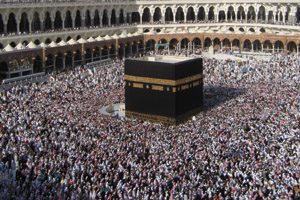
© Shutterstock
Reem Shraiky, UK
Unfortunately, divorce today has often turned into a battlefield of prolonged conflict in which laws and even children are used as weapons of pressure. Each side seeks to defame the other, forgetting that once they were a garment for one another, concealing each other’s faults and offering mutual protection.
Disputes nowadays frequently extend to the families of both parties, cutting ties and sowing discord without mercy. All of this stands in stark contrast to the guidance of the Holy Qur’an and the noble teachings of Islam, which only permits divorce after exhausting every possible avenue of reconciliation.
The Holy Prophet (sa) described divorce as ‘the most detested of lawful things to Allah’ (Ibn Majah, Book of Divorce). The meaning is that although divorce is permissible, it is to be regarded as a last resort.
The Promised Messiah (as) said:
‘Allah and His Messenger have deemed divorce the most detested of lawful things, and it has only been permitted in the most extreme cases of necessity. Just as Allah the Exalted, being the Lord, has provided sustenance for serpents and scorpions, in the same way He has legislated divorce for those whose condition has greatly deteriorated and who are unable to restrain themselves from the trials and afflictions they might face if divorce were not allowed.’ (Badr Newspaper, Vol. 6, No. 3, 17 January 1907, p. 4)
‘And at times circumstances arise in which divorce becomes unavoidable. Thus Islam, which encompasses all matters, instituted the provision of divorce, while at the same time declaring it detestable.’ (Badr Newspaper, Vol. 6, No. 38, 19 September 1907, p. 7)
When divorce does occur, Islam commands that it must be carried out within the framework of justice and kindness, without any form of harm. It should be conducted with love, respect, and preservation of the good that once existed in the relationship, as Allah Almighty says: ‘Either retain them in a becoming manner or send them away with kindness’ (2:230). This divine guidance ensures social stability, maintains mutual respect, and allows marital separation without enmity.
This verse summarises a great principle of Islamic law in handling spousal conflict when marital life becomes impossible. It teaches that marriage is not to be built on coercion or harm, but on love and mercy. If that becomes impossible, then separation must be done with dignity, justice, and kindness, giving each their due rights and avoiding harm or injustice.
Thus, ‘send away with kindness’ signifies that divorce should never be a platform for vengeance or malice, but a time when justice and dignity are upheld. Islam regards marriage as a solemn covenant; if it cannot continue, separation should not become a cause for humiliation or hostility. Rather, it should be conducted with respect and compassion.
Divorce with grace and kindness means:
- Fulfilling each other’s rights.
- Avoiding verbal or physical abuse after divorce.
- Protecting the reputation of each other and refraining from defamation.
- Ensuring children live in an environment of mutual respect.
The verse presents two options: retaining in a becoming manner or releasing with kindness. Both are rooted in justice and mercy. Marriage in Islam is founded upon kindness, and divorce when carried out should be with good treatment. This balance reflects the greatness of the Islamic law, which considers not only legal rights but also human dignity and emotional wellbeing.
The phrase ‘send away with kindness’ is not merely a legal ruling on divorce, but a comprehensive moral principle teaching us how to handle disputes in life: to let others leave our lives with the same dignity with which they entered. Islam teaches the believer to act with excellence in connection and excellence in separation.
Among the great wisdoms of the Islamic law is that Allah commanded that a divorced woman by revocable divorce (first or second time) must observe her waiting period (‘iddah) in her husband’s house, and that he must continue to provide for her during this time, even if she is wealthy or has an income. The wisdom is clear: living together may rekindle affection and lead them to reconcile before the waiting period ends, allowing the marriage to resume without the need for a new contract.
‘O Prophet! When you divorce women, divorce them for the prescribed period, and reckon the period; and fear Allah. Turn them not out of their houses, nor should they themselves leave unless they commit an act which is manifestly foul. And these are the limits set by Allah; and whoso transgresses the limits of Allah, he indeed wrongs his own soul. Thou knowest not; it may be that thereafter Allah will bring something new to pass.’ (65:2)
According to the Five Volume Short Commentary of the Second Caliph of the Ahmadiyya Muslim Community regarding the verse above:
“The procedure of divorce given in this Surah is as follows:
The first pronouncement of divorce should be in the interval between two monthly courses, during which the husband and wife should not have conjugal relations. This ensures that the decision to divorce has not been taken hastily in a fit of anger or under the influence of some other momentary impulse, but after calm and deliberate reflection. Moreover, a divorced wife is to remain in her house until the expiry of ‘iddah (the period of waiting), which extends over three courses.”
The words ‘it may be that thereafter Allah will bring about something new to pass’ signify that this procedure is enjoined because it is possible that during the period of waiting the causes of friction may subside and reconciliation may take place between the estranged parties.
As for the third divorce, the wife becomes permanently unlawful for her husband, and she is no longer entitled to housing or maintenance, except if she is pregnant or nursing, in which case her ex-husband must continue to provide for her until the end of pregnancy or breastfeeding. Allah Almighty says:
‘Lodge divorced women during the prescribed period in the houses wherein you dwell, according to the best of your means; and harass them not that you may create hardships for them. And if they be with child, spend on them until they are delivered of their burden. And if they give suck to the child for you, give them their due recompense, and consult together in kindness; but if you meet with difficulty from each other, then another woman shall suckle the child for him (the father).’ (65:7)
Since the child belongs to the father, he is obliged to provide for him, and this cannot be done without providing for the mother; thus this becomes his duty, just as paying the nursing recompense is his duty.
According to the Five Volume Short Commentary in reference to the verse above:
“In this verse all the possible needs of a divorced woman have been adequately met. During her ‘iddah a divorced woman is to be looked after by the husband with the same care and consideration as when she was the mistress of his house, according to the best of his means, until she leaves the house and is free to adopt the way of life she chooses.”
On the other hand, a divorced non-pregnant or breastfeeding woman with an irrevocable divorce is not entitled to maintenance or housing. Muslim relates from al-Sha‘bi: ‘I entered upon Fatimah bint Qays and asked her about the judgment of the Messenger of Allah (sa) regarding her. She said: ‘My husband divorced me irrevocably, and I disputed with him before the Messenger of Allah (sa) over housing and maintenance. He did not assign me housing or maintenance, but instructed me to observe my waiting period in the house of Ibn Umm Maktum.’’ In another narration in Muslim, she reported that the Prophet (sa) said: ‘There is no maintenance and no housing for you.’ And in Abu Dawud: ‘There is no maintenance for you, unless you are pregnant.’
However, the man is obligated to provide for his child not only during pregnancy and nursing but afterwards as well. The mother is not obliged to spend on the child, even if she is wealthy. This includes expenses of childbirth, housing, food and drink, clothing, nursing wages, medicine, and whatever else the child needs. Once the divorced woman delivers, she has no entitlement to maintenance or housing for herself, but these remain due for the child.
All such expenses are to be determined according to what is reasonable, taking into account the financial status of the father. Allah Almighty says: ‘Let him who has abundance spend out of his abundance. And let him whose means of subsistence are straitened spend out of what Allah has given him. Allah burdens not any soul beyond that which He has bestowed upon it. Allah will soon bring about ease after hardship.’ (65:8)
This naturally varies from one person to another and from one country to another. If the father is wealthy, his spending is according to his wealth; if he is poor or of average means, then according to his situation. If both parents agree on a certain amount, whether small or large, that is acceptable. Both sides should mutually agree on a fair amount that ensures a dignified life for the child and his custodial mother, but in cases of dispute it is for the judge to decide.
Allah says: ‘And the man to whom the child belongs shall be responsible for their (the mothers’) food and clothing according to usage. No soul is burdened beyond its capacity. The mother shall not make the father suffer on account of her child, nor shall he to whom the child belongs make the mother suffer on account of his child.’ (2:234)
Al-Qurṭubī said in his Tafsīr:
‘When Allah, the Exalted, mentioned marriage and divorce, He also mentioned the child, because the spouses may separate while there is a child between them. Thus, the verse refers to divorced women who have children from their husbands. These mothers have more right to nurse their children than strangers, because they are more tender and compassionate. To take a small child away from the mother is harmful to both the child and the mother. This indicates that even if the child has been weaned, the mother still has more right to his custody, due to the superiority of her affection and compassion. She is, therefore, the one most entitled to custody.’
The Promised Messiah (as) said:
‘Always pray for your spouses and avoid divorce, because the one who hastens to divorce is bad and very hated in the eyes of Allah, Glory be to Him. Do not quickly break, like a filthy and unclean vessel, what Allah has joined together.’ (Tuhfa Golravea, Ruhani Khaza’in, Vol. 17, p. 75)
This noble guidance reminds us that marriage is a sacred bond which must never be dissolved in haste or without exhausting all means of reconciliation. Divorce should never be the first option, but only the very last, when no path to harmony remains.
If separation becomes unavoidable, then it must be approached with dignity, fairness, and mutual respect. Spouses should maintain kindness towards one another, honour the good that once existed between them, and continue to pray for each other’s wellbeing. Even when parting, believers are instructed to preserve bonds of humanity and compassion, for this is the true spirit of Islamic teaching.
About the Author: Reem Shraiky is a life devotee of the Ahmadiyya Muslim Community – International Arabic English Translation & Research Office, UK.



Add Comment